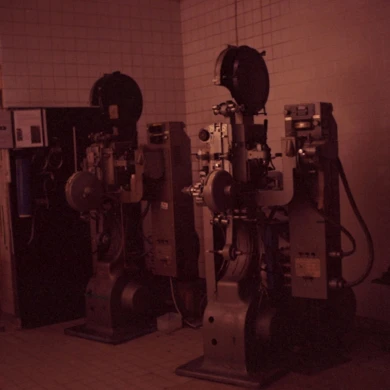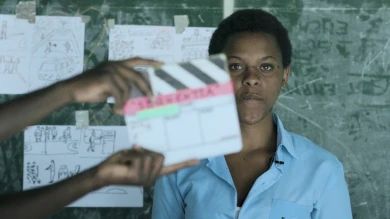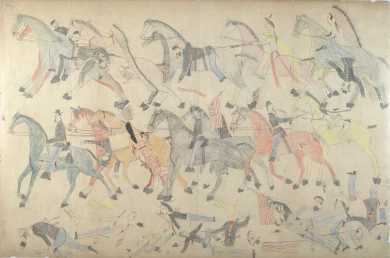Cinema and New Media
The Cinema and New Media activity is structured around three main areas. Firstly, it is worth highlighting the Cine, conceived as a film space that recovers the history and ritual of cinemas and has a regular programme of screenings from Thursday to Sunday. Secondly, there is the support for the exhibitions in Espacio 1, a room dedicated to cinema exhibitions, presentations and experimentation. Finally, the development of research and debate programmes with artists, filmmakers, critics and other agents who broaden the reflection on the practices and urgencies of audiovisual creation.
Sonic and Cinema Commons
Co-organised with L’Internationale, 2025 and 2026
Sonic and Cinema Commons is a research, programming and publishing project that explores how cinema and sonic experiences generate spaces for the formation of interpretive communities, foster collective debate and prefigure proposals for the commons.
Music — and sound in a broad sense — enables unique forms of public creation and expression, whether through sound system culture, on dance floors or through various forms of transmission. The articulation of sound (through the construction of rhythms and sampling) and its circulation (through parties, gatherings and programming) produce specific forms of collectivity that have been central to multiple experiences of community building and counterculture. This axis brings together practices that, in different ways, mobilise the potential of sound spaces as tools for gathering, weaving solidarity and resisting oppression and exclusion.
The project also addresses socialisation processes and the potential of cinema beyond the image. The practices brought together here investigate its capacity to convene, assemble and produce common spaces, understood in architectural, social and political terms. Historically, cinema has been a fundamental tool in various emancipatory and liberating struggles. Based on these histories, the proposals in this area seek to understand what role cinema can play in the current cultural and political context, overcoming the dominant — often violent — forms of representation and their modes of distribution, in order to advance towards new possibilities for the commons.
Overall, this initiative embraces these practices in a broad sense, ranging from the organisation of film forums and listening sessions to the creation of community exhibition spaces. It also includes the development of study programmes focused on film and sound practices, as well as the opening up of sound and moving image production and editing processes.
Since 2022, the Museo Reina Sofía, FIDMarseille, and Doclisboa have been organizing this annual residency program aimed at filmmakers and artists who work in the field of film essay, experimental cinema and in all those manifestations shaping contemporary’s non-fiction cinema. The joint residency between a museum and two international film festivals offers the possibility of articulating different phases between the idea and the materialization of the audiovisual work. The objective of the program is to support the conception, development and production of film projects in the field of non-fiction cinema, finance their execution and partake in the international debate on this field of artistic endeavor.
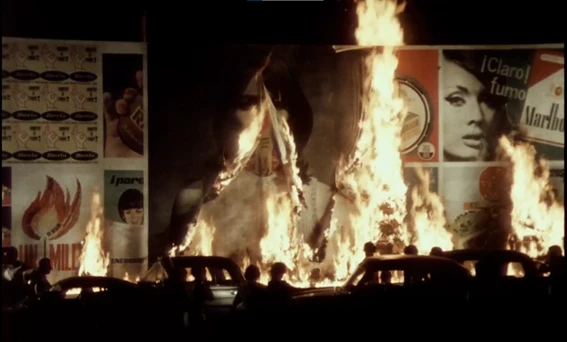
Joaquim Jordà, Dante is not only severe, film, 1967.
The residency consists of a period of research and the development of a project at the Study Centre of Museo Reina Sofía in Madrid, whose research process and necessary access to the Museo's archives, collections and collaborative networks are supported at all times.
The residency also includes participation in FIDLab at FIDMarseille and the Doclisboa think tanks. FIDLab, an international co-production platform for film projects seeking funding and distribution, takes place in July during FIDMarseille (Marseille, France). In this case, the Joaquim Jordá residency projects are automatically evaluated by the independent FIDLab jury and, even if they are not selected, they still enjoy the professional opportunities offered by the platform. Participation in Doclisboa, a prestigious film festival held in October in Lisbon (Portugal), enables the residencies to take part in the programmed spaces for thought and debate, as well as providing access to a selection of professional contacts for connecting with international networks of filmmakers, artists and producers.
The program honors Joaquim Jordà (1935-2006), a filmmaker with an original and emblematic work in the realm of non-fiction whose career spans, among others, the three countries of the institutions that host this residency. A Spanish National Cinematography Awardee (2006), his work is part of Museo Reina Sofía’s collection; his last retrospective during his lifetime was at the FIDMarseille (2006) and one of his early films, Portogallo, paese tranquilo (1969), addresses the resistance to the dictatorship in Portugal. Jordà traced a nonconformist and committed path in the creative documentary, characterized by the use of theatrical strategies and the staging of deeply experimental narratives that this grant seeks to recover and establish as a genealogy of contemporary non-fiction cinema.
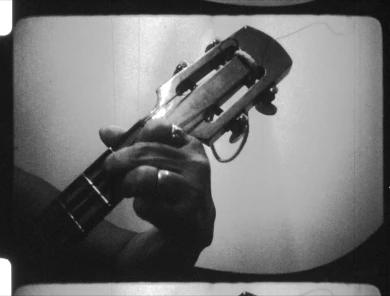
![Carol Mansour y Muna Khalidi, A State of Passion [Estado de pasión], 2024, película](https://recursos.museoreinasofia.es/styles/small_landscape/public/Actividades/palestine%20cinema%20day%202.jpg.webp)
